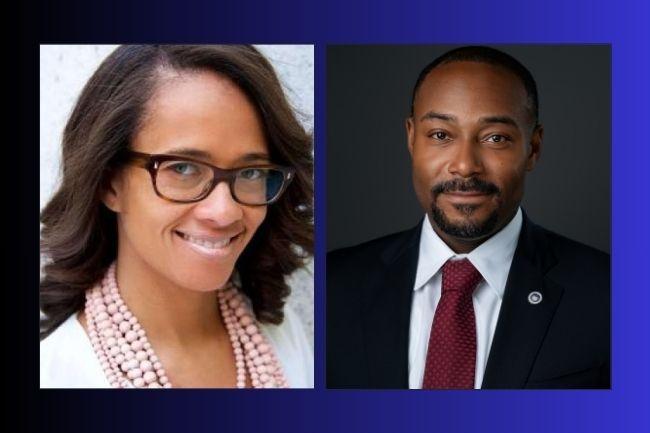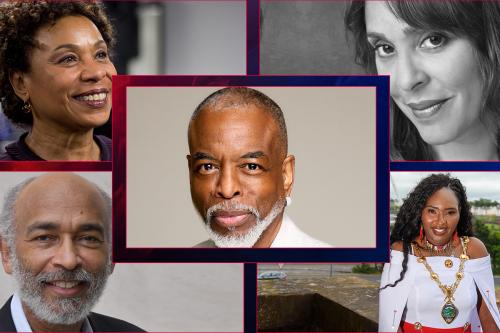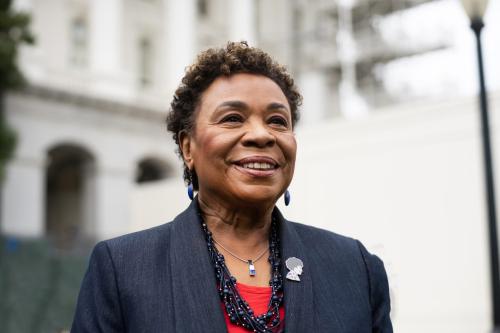The Washingtonian’s annual special edition of the magazine, featuring Washington, D.C.’s 500 Most Influential People of 2025, includes a few names that Howard faculty, staff, alumni and students may recognize.
Tonija Hope, Ph.D., director of Howard University’s Ralph J. Bunche International Affairs Center, and Justin Hansford, professor of law and founder and executive director of the Thurgood Marshall Civil Rights Center, are included in this year’s list of experts and advocates — working outside the government — deemed by the publication to have significant impact in Washington’s policy debates.
Also featured in this year’s list of the most influential in the district are Howard alumni Cedric Grant, partner, government relations at Avoq; Tara Murray, executive director at the Washington Bureau and senior vice president for policy and advocacy at the National Urban League; and Roxanne Brown, international vice president at large at United Steelworkers.
Several factors go into determining who makes the cut, and according to the Washingtonian’s May 7 announcement, its staff works to identify “individuals with deep subject-matter expertise who understand how to effectively drive action in Washington; those who grasp the nuances and complexities of specific policy areas; and experts in fields we believe will be particularly significant to the current slate of elected officials” to make its list of 500. The selection process is rigorous, and while no currently sitting elected official or staffer on Capitol Hill or within the current administration is included in the yearly feature, those included often have government experience and, according to the publication, may have a future in government service — or have the ear of those who do.
“Each year that I’m included is really just a testament to the work that we’re doing for Howard students, but also for the greater community. It’s very humbling and appreciated.” -Dr. Tonija Hope
When asked what the honor means to her, Hope explained that this is actually the third time she’s been named one of D.C.’s most influential, noting that the first time she was included she was shocked, but then it happened again, and again. “It’s very nice to be acknowledged and recognized for the work that I and the center have been doing for 10 years,” said Hope. “Each year that I’m included is really just a testament to the work that we’re doing for Howard students, but also for the greater community. It’s very humbling and appreciated.”
As director of the Ralph J. Bunche International Affairs Center, established in 1993 to serve as “a hub for the University’s extensive international activities and interests,” Hope is responsible for overseeing the Center’s strategic vision and many international engagements, like the university’s study abroad program, international partnership development, global programming, in addition to managing the Patricia Roberts Harris Fellowship for students and supporting fellowship programs for the U.S. Department of State and the U.S. Department of Agriculture.
While on a list about influence, for Hope, it’s more about the impact that she can have on students and their ability to make an impact in the world. “The focus is always on the students and how we can impact their awareness and access to opportunities in some of these different spaces, particularly in D.C.,” she began before mentioning her positioning on Washingtonian’s list under foreign policy. “I actually don’t think that that’s where I’m influential; it’s more education. But because of the nature of the work that we do and the people that we bring, they’ve placed me in this foreign policy category,” she said. However, for her, it really goes back to the opportunities for connection and access she provides to students and world leaders alike.
“I may be influencing that [foreign policy] by providing opportunities for leaders from around the world to engage with our students, so that they can hear from our students what is on their mind, and how they would like to see policy shifted.”
It’s similar for Hansford, who notes that while many equate influence with power for oneself, the real influence lies in how you can impact the community. “A lot of the things that we’ve been able to do in terms of influence have been for our folks, for Black folks who are trying to respond to police violence, housing segregation, and the legacies of slavery,” he said, going on to list the many initiatives that the Thurgood Marshall Center has been instrumental in lately, including working with Mike Brown’s mother to promote a bill in Congress that would provide mental health resources for families impacted by police violence, working with local reparations commissions, and more. “We’ve been able to use power to help vulnerable communities and our people.”
"The Thurgood Marshall Center serves as a powerful platform, amplifying the message and mobilizing support for critical issues in our nation. It embodies hope for a future where justice prevails, and every individual is valued equally.” -Professor Justin Hansford
That said, his inclusion on the Washingtonian list is an affirmation of the work he and the center he founded at Howard University Law School in 2017 continue to do, as well as its continued importance to, and impact on, the community. “Being recognized as one of the top 500 most influential individuals in Washington, D.C., is a profound affirmation of not just me as an individual, but of the causes that the Thurgood Marshall Center has stood for that have been so under fire: critical race theory, reparations, and human rights for African Americans,” he said. “It shows that people in Washington still understand the urgent need for systemic change; they understand the importance of thought leadership and activism in this process, and they see Howard University as an ongoing place of leadership for exactly that.”
The center, designed to serve as the university’s “flagship institutional setting for the study and practice of civil rights, human rights, and racial justice law and advocacy,” has become an influential force and voice in the district and beyond. “The Thurgood Marshall Center serves as a powerful platform, amplifying the message and mobilizing support for critical issues in our nation,” said Hansford. “It embodies hope for a future where justice prevails, and every individual is valued equally.”
What’s next for Dr. Hope, Professor Hansford, and their centers? “I just want to keep doing this and creating opportunities with more people for our students,” said Hope. That said, she’s hopeful that her inclusion on Washingtonian’s list will provide more opportunities and resources for the International Affairs Center. Acknowledging her team’s “innovation and the depths of our relationships that we’ve been able to provide such programming, without as many resources,” she’s hopeful the visibility will “encourage greater investment in the work that we do, so that the work that we do can be even more impactful.”
The professor looks forward to expanding the work of the Thurgood Marshall Center beyond the law school. “We’ve done a lot on the law school side and want to work with main campus much more,” he said, sharing that work is being done to start a main campus branch of the center with plans to hire more student interns, for example. He plans to “find ways to involve students in our work fully; not just the law students, but also students who are interested in the work on the undergrad side.”
The Howard staff and alumni represented in this year’s 500 most influential list all embody the founding principles of the university, proudly demonstrating a commitment to truth and service that is so clearly recognized globally, by the community, and in Washington, D.C.
“I’m just glad that Howard continues to be recognized as a place of enduring power and advocacy and the relentless pursuit of a just future for our people is still core to our mission,” said Hansford.





